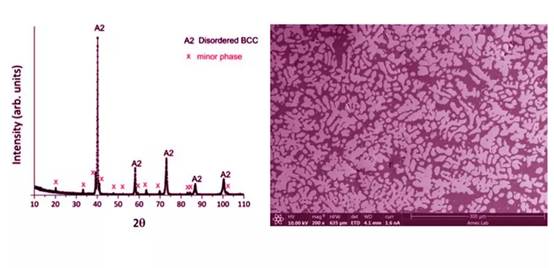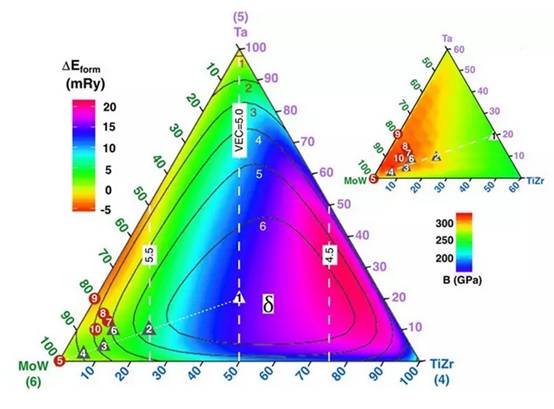npj:高强度难熔复合固溶体合金——通过电子结构筛选
镍基高温合金和含钼近等原子高熵合金都具有较高的温度强度和耐腐蚀性。但要设计复杂的固溶合金空间巨大。美国爱荷华州立大学Duane Johnson教授等用密度泛函理论研究了由五种难熔元素(钼、钨、钽、钛和锆)构成的设计空间,确定了用于冶炼高温强度和耐腐蚀性富钼合金的最佳组分。他们将第一性原理计算与电子合金设计标准相结合,通过相干势近似来展示KKR电子结构方法,以便在五维设计空间上鉴定合金,改进其力学性能和必要的全局(形成焓)和局部(短程有序)稳定性。通过预测杨氏模量、短程原子有序等结构性质,以晶格常数确定每种组份的整体稳定性、快速筛选设计空间以选择出合金的最佳组分。所预测的、稳定性得到改善的复合固溶体合金,比近等原子情况下弹性模量大大提高(在300 K时提高3倍,与实验验证结果一致),温度在500 K以上时的合金弹性模量也比商业合金温度为2000 K时的模量要高2.3倍。作者的研究还表明,鉴于关键的电子效应,最佳复合固溶合金不能用经典势函数很好地描述。他们的方法还可用来优化其他复杂固溶合金以提高其力学性能。该文近期发表于npj Computational Materials 4:16 (2018); doi:10.1038 /s41524-018-0072-0。

Design of high-strength refractory complex solid-solution alloys
Prashant Singh, Aayush Sharma, A. V. Smirnov, Mouhamad S.Diallo, Pratik K. Ray, Ganesh Balasubramanian & Duane D.Johnson
Nickel-based superalloys and near-equiatomic high-entropy alloys containing molybdenum are known for higher temperature strength and corrosion resistance. Yet, complex solid - solution alloys offer a huge design space to tune for optimal properties at slightly reduced entropy. For refractory Mo-W-Ta-Ti-Zr, we showcase KKR electronic structure methods via the coherent - potential approximation to identify alloys over five-dimensional design space with improved mechanical properties and necessary global (formation enthalpy) and local (short-range order) stability. Deformation is modeled with classical molecular dynamic simulations, validated from our first-principle data. We predict complex solid - solution alloys of improved stability with greatly enhanced modulus of elasticity (3× at 300 K) over near - equiatomic cases, as validated experimentally, and with higher moduli above 500 K over commercial alloys (2.3× at 2000 K). We also show that optimal complex solid-solution alloys are not described well by classical potentials due to critical electronic effects.
